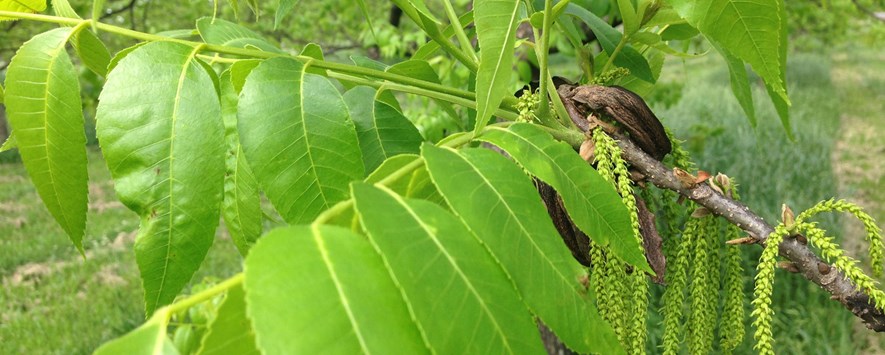Tim Montz and family continue growing their pecan business after nearly 40 years.
The Pecan Shed started out in what Tim Montz describes as more shack than store: a tiny building about the same size as his current office.
The rented space was heated by only a small, plug-in appliance that Tim’s children, Jake and Jill, remember did little to warm the shop during peak season. From Thanksgiving through Christmas, neighbors would stop by to purchase pecans Tim had harvested or to have their own cleaned and shelled.
 Customers browse through the Pecan Shed in Henrietta, Texas.
Customers browse through the Pecan Shed in Henrietta, Texas.
Tim had been much like many of his customers just a few years prior to opening the store in 1981. He grew up raising wheat, cotton and cattle with his grandfather just south of the Red River, near Charlie, Texas, and branched out to farm on his own as a young man. He soon found he was only making enough to scrape by and, in 1978, started picking up pecans by hand on some of the land he leased.
At first, Tim was just looking for some extra Christmas cash. Then he saw potential for profit in the native nut. He began leasing more land with native groves, and, by 1985, some of his landlords were asking him to plant more trees.
Jake and Jill don’t remember a time when pecans were not a central piece of their family dynamics. They were such a part of life that Jill used to joke she had one biological brother and thousands of other siblings in the form of pecan trees.
 A Family Affair
A Family Affair
Tim Montz (on tractor) grew up raising wheat, cotton and cattle with his grandfather along the Red River, near Charlie, Texas. In 1978, he began picking up a few pecans to sell. Today, he and his children, Jake (left) and Jill (right), manage 25,000 pecan trees and two stores that ship pecans across the country.
“The pecans took a lot of Mom and Dad’s time,” Jill says. “We saw them work hard.”
Tim would farm during the day and bale hay at night, often working all day, seven days per week. Many nights, he would come home after Jill and Jake were tucked into bed and head back to the fields before they awoke.
At one point, he was managing 300 cows and 2,000 stocker cattle as well as farming 2,500 acres of wheat to make ends meet and help pay for trees and irrigation. It takes up to 10 years for a pecan tree to start producing, which means he was often tending trees that were not generating any income.
The Montz family is great to work with because they understand the value in building together. They each play to their strengths, which has made the overall operation incredibly successful... .”
— Charles Rohla, Ph.D.
Pecan and Specialty Agriculture Systems Manager
“It was a long struggle,” Tim says. “It took several years. I didn’t have the money to plant everything at once, but I knew I had to make it a go. Failure wasn’t an option because I had all my money tied up in trees.”
Tim, whose own farming experience began on a tractor with his grandfather by age 8, started his kids young. Jake and Jill spent their summers in the orchards spraying for weeds. When they got in trouble, Tim would send them out to prune trees.
“I was good at finding them something to do,” Tim laughs.
Neither sibling originally thought they wanted to return to the family business, but Jake decided to come home once earning his horticulture degree at Tarleton State University. Jill soon followed after earning a business degree and working in HR at the local hospital.
 Tim Montz steps down from his tractor after mowing the orchard floor.
Tim Montz steps down from his tractor after mowing the orchard floor.
“There is just something about this place that you can’t get anywhere else,” Jill says. “It’s part of our heritage, and I’m proud that we’re able to share that with other people by being part of their family traditions.”
One of the Montz family traditions is a partnership with Noble Research Institute, which began when Tim sought advice on how to plant pecan trees in 1985. Consultants answered Tim’s questions about establishing new orchards and offered recommendations for the cattle operations he managed.
Now the family also offers their orchards as a location for Noble educational events in addition to a laboratory for researchers exploring different ways of improving production.
 Jake Montz inspects trees for signs of pecan nut casebearer eggs.
Jake Montz inspects trees for signs of pecan nut casebearer eggs.
“The Montz family is great to work with because they understand the value in building together,” says Charles Rohla, Ph.D., pecan and specialty agriculture systems manager, who spent three summers in Montz orchards studying different nut thinning techniques for his doctoral work. “They each play to their strengths, which has made the overall operation incredibly successful, and they are just good, welcoming people who are always willing to help others interested in the industry.”
Today, Jake manages the family’s 25,000 trees, which yield 1 million pounds of pecans in a good season. He continues to call on Noble consultants for advice on cultivar selection, efficient irrigation and pest management.
Jill manages the stores. No longer is The Pecan Shed a simple shop. The Montz family has a wholesale location at Wichita Falls, Texas, and another, larger retail store with a gas filling station off Highway 287 in Henrietta. They also ship pecans to every state in the U.S.
 Divide and Conquer
Divide and Conquer
Tim Montz mows the floor of one of several pecan orchards, which, as he moves toward retirement, Jake now manages. The trees produce 1 million pounds of pecans in a good season, and Jill oversees the stores that sell their harvest both wholesale and retail.
They both have ideas for the future — like expanding the orchards and enhancing their customers’ experiences — but they continue to build upon the foundation their father set.
“We’ve been fortunate to watch Dad, to see the lessons he’s had to learn and the attitude he has” Jake says. “He’s taught us that no matter what happens, we can work our way out of it together.”




